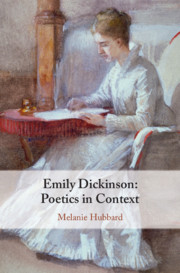In American culture, there is a mix and mismatch of core discourses: religious, Enlightenment, and market economy. Each claims, contributes, and competes for kinds of belonging and national definition, by abstract principles of equality, particular community of religion and nation, and possessive individualism of each one’s own self-interest. Poetry, far from being private reflection or self-referring aesthetic object, is an arena in which each of these discourses encounter each other. Widely circulated in newspapers, magazines, publicly recited, poetry took part in and also refracted, in especially intense and focal ways, the drama, questions, and terms of belonging crucial to, and conflictual in, the unfolding of America. In this chapter, I explore the intercrossing and contention between American discourses of religion, Enlightenment, and individualism in the Abolitionist poetry of Whittier, the poetry of war in Herman Melville and Emily Dickinson, and the poetry of participation in Walt Whitman. In the texts of each, vocabularies, terms, allusion, and critique of American cultural, religious, and political life form complex interchanges, at times through alignment, at times in tense and critical relationship. The poem becomes a field of confrontation, appeal, and address within the context of their writing as voices of culture take on poetic force.
